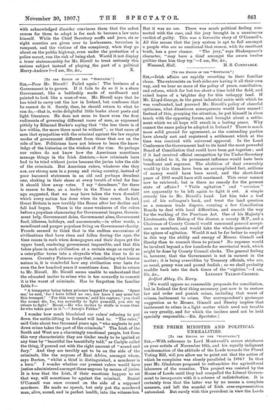[TO THE EDITOR OF THE " SPECTATOR."]
SIR,--Poor Mr. Birrell ! Failed again ! The business of a
Government is to govern. If it fails to do so it is a sham Government, like a battleship made of cardboard and painted to look like a man-of-war. Mr. Birrell says that he has tried to carry out the laW in Ireland, but confesses that he cannot do it. Surely, then, he should return to what he
can do,—that is, write delightful little books about poets and light literature. He does not seem to know even the first rudiments of governing -different races of men, as expressed pithily by Edmund Burke's saying that "the less there is of law within, the more there must be without"; or that races of men that sympathise with the criminal against the law require modes of government different from those that are on the
side of law. Politicians have not leisure to learn the know- ledge of the historian or the wisdom of the wise. So perhaps our rulers do not know how the Americans sometimes manage things in the Irish districts,—how criminals have had to be tried without juries because the juries take the side of the criminals. But American rulers, whatever else they are, are strong men in a young and rising country, instead of poor harassed statesmen in an old and perhaps decadent one, shaking in their shoes at every breath of wind for fear
it should blow away votes. I say " decadence," for they is reason to fear, as a leader in the Times a short time ago suggested, that we may have taken the turn downhill which every nation has done when its time came. In fact, Great Britain is now terribly like Rome after her decline and fall had begun. There is the same weakness of the rulers before a populace clamouring for Government largess, Govern- ment help, Government doles, Government alms, Government
food, idleness, holidays, and amusements,—in other 'words, a mendicant and pauper populace living on Government charity.
Fronde seemed to think that in the endless successions of civilisations that have risen and fallen during -the ages, the time comes in each when demagogues and their dupes get the upper hand, rendering government impossible, and that this takes place in each civilisation at a certain stage as surely as a caterpillar turns into a chrysalis when the time to do so comes. Coventry Patmore says that, considering what human nature is, it is wonderful how any civilisation ever lasts for even the few hundred years it sometimes does. But to return to Mr. Birrell. Mr. Birrell seems unable to understand that the educated inciter to crime who is too cowardly to commit it is the worst of criminals. Has he forgotten the familiar fable F-
- " A trumpeter being taken prisoner begged for quarter. Spare me,' he said, for I have killed no one, nor have I any arms but this trumpet." For this very reason,' said his captors, 'you shall the sooner die, for, too cowardly to fight yourself, you stir up others to fight.' Moral.—He who incites to strife is worse than he who takes part in it."—" Aesop's Fables."
I wonder how much bloodshed our rulers' refusing to put down the cattle-lifting in Ireland will lead to. " The ruler,"
said Cato about two thousand years ago, " who neglects to put down crime takes the part of the criminals." The Irish of the South and West are a charmingly emotional people, but from this very characteristic they are tinder ready to be ignited at any time by "beautiful lies beautifully told," as Carlyle called the thing, if poured out with the right amount of " sound and fury." And they are terribly apt to be on the side of the criminals, like the negroes of East AfriCa, amongst whom,
says Burton, "whilst a thief is distinguished, a murderer is a here." I wonder whether our present rulers would have justice administered amongst these negroes by means of juries.
It is true that the Irish, if their emotions happen to set that way, will sometimes be against the criminal. Daniel O'Connell was once counsel on the side of a supposed murderer. HO made no speech, but only put the murdered man, alive, sound, and in perfect health, into the witness-box.
But it was no use. There was much political feeling con- nected with the case, and the jury brought in a unanimous verdict of guilty. This was a favourite story of O'Connell's. All this means that the jury system is apt to fail amongst a people who are so emotional that reason, with its resultant truth, has a poor chance. " The jury," says Shakespeare's character, "may have a thief amongst the sworn twelve guiltier than him they try."—I am, Sir, &c.,


















































 Previous page
Previous page